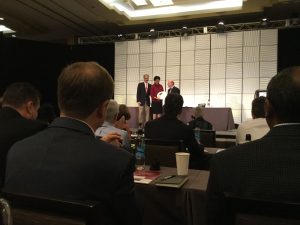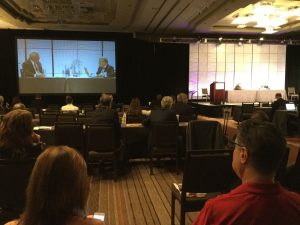Observations and Opinions of Dana and Rob Gourley, AquaNew, on Presentations and Discussions at the 2017 Beverage Forum, April 2017, Chicago, IL.
 What are the beverage companies doing to make healthier products preferred by women? This was one of the leading questions consistently raised by the audience at the recent Beverage Forum. Many tried to answer this important question, including keynote speakers who are world-renown corporate heads, including PepsiCo’s CEO Indra Nooyi, who is also a mother. She was presented with Beverage Forum’s Lifetime Achievement Award this year (shown in the photo to the left).
What are the beverage companies doing to make healthier products preferred by women? This was one of the leading questions consistently raised by the audience at the recent Beverage Forum. Many tried to answer this important question, including keynote speakers who are world-renown corporate heads, including PepsiCo’s CEO Indra Nooyi, who is also a mother. She was presented with Beverage Forum’s Lifetime Achievement Award this year (shown in the photo to the left).
In addition to several founders of “rising” star products, other corporate heads of major beverage companies were also interviewed, including two former Nestle CEO’s Kim Jeffery and Tim Brown, Coca-Cola North America’s President Sandy Douglas, Molson Coors’ Vice Chairman of the Board Pete Coors, Dr. Pepper Snapple Group’s Executive Vice President James Trebilcock, and Monster Beverage’s CEO Rodney Sacks. The latter talked about “Monster Ultra Energy” drink with natural zero-calorie sweetener paired with lower dosage of energy additives (caffeine) – intended to appeal more to women.
 The panel members also had a diverse range of expertise. There were marketing consultants who use complex models to analyze the mindset of individuals in purchasing a specific beverage product and then targeting groups of “similar” individuals nationwide with digitalized ads. At least one of the panels included “shopping” futurists who believe we will have our “favorite” lists on our phones and we will order groceries online. For delivery, there will be multiple options including a pickup location with valet service to load the groceries into your car, or a drone arriving at your doorstep, or a driverless delivery truck. Finally, there was a panel of leading Wall Street executives, including Bonnie Herzog, Managing Director for Wells Fargo Securities. She opined that Monster’s Hydro enhanced energy water, which may launch into the market later this year, is like “Gatorade on steroids.” Monster’s Hydro will be in a see-through can with an aluminum top. When the security advisors were asked if they were aware of any new healthy innovations on the horizon, all four of them seemed to have no shining examples at this time. Of course, Rob and I wanted to raise our hands and tell the august group about the Polarized Water story.
The panel members also had a diverse range of expertise. There were marketing consultants who use complex models to analyze the mindset of individuals in purchasing a specific beverage product and then targeting groups of “similar” individuals nationwide with digitalized ads. At least one of the panels included “shopping” futurists who believe we will have our “favorite” lists on our phones and we will order groceries online. For delivery, there will be multiple options including a pickup location with valet service to load the groceries into your car, or a drone arriving at your doorstep, or a driverless delivery truck. Finally, there was a panel of leading Wall Street executives, including Bonnie Herzog, Managing Director for Wells Fargo Securities. She opined that Monster’s Hydro enhanced energy water, which may launch into the market later this year, is like “Gatorade on steroids.” Monster’s Hydro will be in a see-through can with an aluminum top. When the security advisors were asked if they were aware of any new healthy innovations on the horizon, all four of them seemed to have no shining examples at this time. Of course, Rob and I wanted to raise our hands and tell the august group about the Polarized Water story.
State of the Beverage
The panel of Wall Street security advisors, based on declining volume trends and recent news of employee layoffs (Coke) and stock pricing declines within the beverage sector (Dr. Pepper’s stock value fell 6% the day prior), seemed to agree that there may be liability in owning a major brand. It is a massive difficulty in offsetting declines in major brands. Some of the major beverage companies seem to have either maintained separate corporate teams for growth brands or established allied partners with other outside beverage products (e.g., Dr. Pepper’s business relationships with Fiji Water, Body Armor and more recently, Bai). Price increases in beverages, including carbonated soda drinks (CSD’s) in smaller serving containers (more costly per ounce than a regular-sized can) and beer, have covered some of the gap in volume sales losses. However, the economic reality is bottled water by volume has now captured over 50% of the entire beverage market and is projected by the experts to continue its growth climb for several more years to come.
Healthier Beverage Concepts
The statistics above are proof that the customer is successfully voting with her pocketbook. It is inevitable that the beverage companies must respond and attract a major part of the market share to improve on their bottom line … women who shop for healthy and good tasting products for themselves and their families. Guess what? Based on our analytics, about half of our inquiries are coming from men who also are searching for healthier choices.
PepsiCo’s Indra Nooyi boldly stated during her presentation that plant-based sweeteners do not taste good in the bottle. As a side note, her statement inspired Rob and me to think about an experiment to see if Stevia and other combined ingredients remain flavorful longer in the Polarized Water. In any case, Indra continued that PepsiCo’s plan is to slowly adjust the “taste buds” of Americans by substituting 20 calories of sugar with sweetener each year … slowly weaning us from the sugary sweet sodas that we enjoy today.
Indra also said water itself is not interesting. She is a fan of sparkling water (lots of bubbles) as an alternative for consumers who enjoy the carbonation in soda. For enhancement of water, Indra mentioned certain fascinating herbs they have discovered in China that could become additives. She also said PepsiCo is considering line extensions into warm beverages, particularly those enjoyed during the wintertime. PepsiCo, under Indra’s leadership, intends to keep their “customers captivated” by launching new brands that recraft the functionality of bubbling beverages.
Another key woman in the beverage world is Azania Andrews, Vice President for Michelob ULTRA. She mentioned that for the first time the sales of active wear outsold jeans. ULTRA successfully uses key words of “exercise” and “workouts” in their advertising to encourage active adults to refresh after their workout by drinking lower carb/lower calorie lager beer.
Authenticity vs. Whim
Rob and I use a broad brush in saying beverage companies should play down on advertising the “whim” of drinking their beverages such as Coke’s ad campaign of “Taste the Feeling.” We are only using this as one example. However, it is hard-core selling with close-ups of Coke products and people drinking them.
We are not marketers and do not have the back room statistics on what motivates the buying power of customers. However, we know that – overall – customers are smart and want to know about the health differences of the many products available on the market without the advertising noise and clutter, or a feeling of being stalked with multiple focused ads that pop up on their computer devices. After all, drinking liquids is essential for life, and we all want to make informed buying decisions.
Amazon, and Walmart’s recently acquired Jet.com, may change how we shop, and likely major brands will pay these e-commerce companies to show up first on our “favorite lists.” But wait a minute. Some of the digital experts at the Beverage Forum recognize there will likely be customers who may prefer locally crafted, wholesome products made by small businesses that socially engage their customers with health information. In other words, building on the customer’s emotional connection and loyalty to a given product that is rooted in science. It is referred by these marketing experts as David (private label products) beating Goliath. The real reason that “David” is winning in our opinion, is customers support authenticity, and are neither sold on brand design nor glitzy “whimsical” advertising.
AquaNew’s Mission
In closing, we enjoyed shaking hands with the legendary folks of beverages. They are generally humble due to the ups-and-downs of beverage manufacture. They never lose the thrill of seeing their products on shelves … each product like Watt-Ahh® has its own unique story. Some beverages are disruptive and skyrocket into the market (the current darling is Bai, filtered water with low-calorie sweetness from plant-based sweeteners and 3% exotic juice, sparked in part by a Justin Timberlake and Christopher Walkin Super Bowl Commercial,) while others are patiently cultivated for years (total of 36 years including 8 years of no growth for Sam Adams, one of the original craft beers). AquaNew’s business plan involves measured annual growth in sales and primarily relies on the core of customers to tell their friends and family about the benefits of the Polarized Water. If someone feels good and more energetic to live their life, they like to share their happiness with others. We appreciate the high rate of reorders but realize it is primarily supported by our customers sharing their good stories which works to also validate the science behind the Polarized Water.
We introduced ourselves to the corporate decision makers attending the Beverage Forum, and boldly pitched to them that the Polarized Water is the best base ingredient to make their products both healthier and more functional as well as flavorful by reducing the bubble gum after-taste of certain sweeteners, perhaps changing the mindset of additional health-wise customers towards buying their products. The Polarized Water also will give the true “premium” in new bottled water products currently being developed for the market, intended to ride the continuing rise in bottled water sales.
We will see if Goliath calls David!
